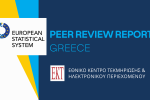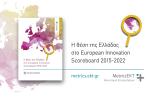
The new study by the National Documentation Centre (EKT) “Statistics on PHD Graduates from Greek Universities 2017” reveals some interesting data on the research personnel of the country, specifically about new PHD holders. The study presents data on those receiving PhDs in 2017 from Greek universities, allocated per institute and department, scientific field, international mobility, previous degrees etc. Also, comparative analysis data of selected indicators are available for 2015, 2016 and 2017, presenting demonstrated trends and temporal fluctuations.
As noted by the Director of EKT, Dr Evi Sachini: 'The statistics on PhD holders are now included in the official RDI statistics produced by the National Documentation Centre as a competent institution of the Hellenic Statistical System. This inclusion is an indication of the great importance attached to the issues concerning highly skilled human resources, particularly this population group, as a national source of knowledge and as productive human capital towards the transformation of the Greek economy'.
According to thesis submissions to the Greek National Archive for PhDTheses (www.didaktorika.gr), there were 1,649 new doctoral graduates from Greek universities in 2017.
In terms of the distribution of new doctorates per institute, most were awarded by the National and Kapodistrian University of Athens and the Aristotle University of Thessaloniki with 27.7% and 18.2% respectively. They were followed by the National Technical University of Athens, the University of Patras and the University of Thessaly (8.7%, 7.1%, 7.0% respectively).
As far as gender is concerned, 52.2% of new doctorate holders were men and 47.8% women. Those who were 35 years old in 2017, were in the majority (46.3%), followed by the 36-44 age group (35.2%).
Most theses were in Medical and Health Science (28.9%), followed by Natural Sciences (26.2%) and Social Sciences (21.4%). Engineering and Technology (17.2%), the Humanities (11.9%) and Agricultural Sciences (3.0%).
In terms of the educational level of the doctorate holder's parents, for 41.0% at least one parent had a university degree, 29.4% graduated from secondary school, 11.8% finished primary school, 8.2% had a PhD and 6.3% a master's degree.
20.6% of doctoral graduates required 5 years to complete their thesis. Percentages for those requiring 6,7 and 4 years for completion were 16.2, 14.0 and 13.0 respectively, while 11.4% took 10 or more years.
Regarding geographical mobility, 335 people (24.5% of total responses) resided abroad during their doctoral studies for reasons other than tourism. The most popular countries were Germany and the UK (21.5% for both). "Statistics on Doctoral Graduates from Greek Universities 2017" is the third annual study published by EKT. Recognising the importance of young PhD holders as highly skilled human resources, the National Documentation Centre, as the body producing the national RDI statistics, has included them in the official statistics to produce indicators that capture essential characteristics.
Data is extracted from the Greek National Archive for PhD Theses, the maintaining of which has been the legal deposit duty of EKT since 1985. With more than 40,000 theses digitally available, the Greek National Archive for PhD Theses is a unique repository of Greek scientific output and knowledge.
Longitudinal data and trends
In a separate unit of this publication, the changes over the 2015-2017 period are presented with selected indicators not only from the current publication but also from data included in the two previous publications, namely 2015 and 2016.
In terms of distribution of doctorates awarded per institute, the National and Kapodistrian University of Athens and the Aristotle University of Thessaloniki remained the firm leaders and were followed by doctoral graduates from other universities.
Most PhD holders received their degrees from institutes within Attiki and Central Macedonia. As for age, the majority were 35 years old.
The leading scientific fields were Medical and Health Sciences, followed by Natural sciences, Social Sciences and Engineering & Technology
The greatest differences noted were in the length of the doctoral studies over these three years, 2015,2016 and 2017. While in 2015 new PhD holders had taken 6 years to complete their studies, in 2016, the majority had taken 7 years and in 2017, 5 years.
Finally, personal savings and support from their families remained the main source of funding for their studies, while receiving scholarships from Greek institutions was also considered important.
















